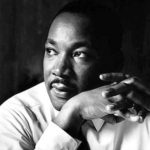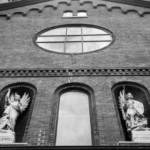I have been (slowly) digesting Simon Chan’s Spiritual Theology: A Systematic Study of the Christian Life and I am barely past Part One: The Theological Principles of Spiritual Theology, and I got to chapter five, “The Church as the Community of Saints” and these words struck me down…
…when Luther invoked the universal priesthood of all believers and abolished the monastic system, the idea of the church was radically reconceived. Theoretically, it should uplift all believers [to become priests] but in actual fact it tends to reduce them to the lowest common denominator. We wanted to make everyone in the church into robust saints but succeeded only in making mostly mediocre ones. We expected everyone in the church to be the remnant reaching out to the world. But there is a whole body of people belonging to the visible church who are at best partially committed. Where do they fit in? We need a theology that makes sense of their presence. – p105 [Cf. 1 Peter 2:9 for the basis of the doctrine of ‘priesthood of all believers’]
I believe this is true at our church. We asked people to sign the Full Participants covenant to wholeheartedly strive towards (not perfect) our basic discipleship pattern of Surrender to Jesus, Come Together as the church, and Love Others. But when people raised their hand or signed up signifying submission to the ideal, and then some fail to even begin towards the Surrender Together Love discipleship paradigm, then we are left with – with not much room to act. We could go heavy-handed and chase people down. We could turn a blind eye and say “Well, it is nice to have good intentions to love God. But we all know it is really difficult.” Chan quotes an older book by an Anglo-Catholic Martin Thornton, Pastoral Theology: A Reorientation (1956), who calls for a reorienting of what we consider our “target audience” (just to use popular terms though I dislike the marketing language these days). He proposes we do not target “all” but rather those who deliberately commit to a life of contemplative prayer.
The rank and file of our parishes do not queue up at the Rectory door for spiritual counsel; – Thornton, p.13 This is quite true – many within the church are not diligent pursuers of deeper connection with g-d through Jesus. Or more precisely, they do not wish to pursue prayer, contemplative prayer, relational prayer (though let us be clear: they do pray). Thornton says we should focus on those who are deeply committed – not in spite of those who are not, but to help those who are not – yea, FOR those who are not.
Thornton uses the word “remnant” to describe this group of spiritual pray-ers. He is thinking of the 2nd Isaiah group of “faithful” who persevere for the entire Jewish nation (p.22-23). In the Deutero-Isaiah world there are the un-elected Gentiles, the apostate Hebrews, and then this faithful remnant who carry the rest of the nation through their purity of worship and loyalty in religious faith. The remnant act on behalf of the whole nation. Thornton calls this the vicarious principle. The remnant are not a separated special class but rather locate as the center of the nation, their blood pulsating out, giving life to the rest. They are the leaven that leavens the whole lump, the salt that makes the dish taste good, the mustard seed that grows into the large tree. In this vein of thought, the rank and file church-people are infused with the Spirit by being in community with this center. Both need each other.
Let us rethink the dogma of the priesthood of all believers, AND grasp a deeper richer understanding of the CHURCH (ecclesiology) and Presence — that is, Sacramental Theology. Allow me to decode. Are we the church – no matter where we go even when we are not together? The answer is a qualified ‘yes.’ We are the church scattered or dispersed. The church sent or in older language, the church Militant. Yet, there is a more demonstrable church when we are gathered, particularly around the Lord’s Table, but as well as when we are in casual table fellowship, worshipping, in prayer together. This richer church is Gathered, and best Gathered within the Presence of the Trinity. (Did that really decode anything?)
Let me borrow from Thornton: when a soccer team wins the match, everyone says “we won!” The fans say we won, the benchwarmers say we won, and of course the top five players say we won. The first five did the work, but the rest participate vicariously. What is the church? Is it just the ministers? Catholic ecclesiology believes the Bishops are the church, best I can tell. Is the church a collection of private individuals, EACH AS THE CHURCH – sort of a confederacy of churches? No. The church is the Bride of Christ (implied in Rev.19.7 “new nation”; 22.9,10 “Zion/Jerusalem”; 22.7 “believers”). The church is a pervasive entity – a whole reality. YET the church is compromised of ministers and congregants – individual humans. These individuals become an organic whole when gathered. Now if that is understandable and acceptable, then it follows that within the Body there are various callings, vocations, gifts and so forth. Reference Ephesians chapter four.
Some who are called to prayer (the deepest kind) have a vocation within the church to pray — not for the church only, not beside the church, or even alongside the church, but AS THE CHURCH – and by such a statement I mean ‘pray for those who are not called to deeper prayer.’ This makes sense to us if we speak of someone being called to minister to small children. They are called, but I am not. I understand that their ‘win’ is my ‘win.’
Most of us evangelicals lack a proper ecclesiology. We substituted mission for church. We privatized discipleship. And let us admit it: we just have no concept of Sacrament even though Calvin said the church is constituted around Word and Sacrament – what happened to Sacrament being equal to Word? (It was replace by singing). We let ‘the priesthood of all believers’ run roughshod over the entire church instead of correcting what Luther intended: that the altar would be brought out from behind the veil, and the entire church gets to partake of the host. Priesthood of all believers was an attack on the priestly class (abuses) – but it was never intended to deconstruct the church into private individual ‘churches’.
We should take this on. We should enrich our understanding of callings, roles and vocations. We should lean in to our callings. Does this mean that those who are not called to contemplative prayer are off the hook? No. Those who will not, refuse to pursue prayer (and let’s be clear: prayer is the core of any religious faith) must be encouraged to go back to the beginning – to be found by Jesus, receive grace and begin the relationship with Jesus. Surrender necessitates Together. No one can be a church unto himself/herself. To say otherwise redefines the word ‘church.’
I am considering a called out group of people who pray, and pray AS the church. They would be an Order of pray-ers. They would live out a rule of life, be the most serious about Full Participation, model it, express it, and make it attractive to everyone. But let us stop fooling ourselves into thinking that if everyone isn’t a Full Participant then we have failed. That just isn’t good ecclesiology; that leaves no space for “the church” and all of its parts. See 1 Corinthians 12-14 and 15 in my opinion. We already have a cross section of the church who regularly make retreat with solitude and silence, participate in Lectio Divina, attend a Day of Solitude and live by a contemplative rule of life within Lakeland. This “remnant” should be an easy idea. However, this word remnant has to go. I’d prefer the term “Spiritual Order.” Can you imagine an affluent suburban evangelical church with quiet, humble and hospitable monks wandering about?
I will continue to work this out for now. But I feel this small remnant (Spiritual Order) within a larger corporate reality is the natural outcome of our present trajectory as a spiritual community called ‘the church’.







